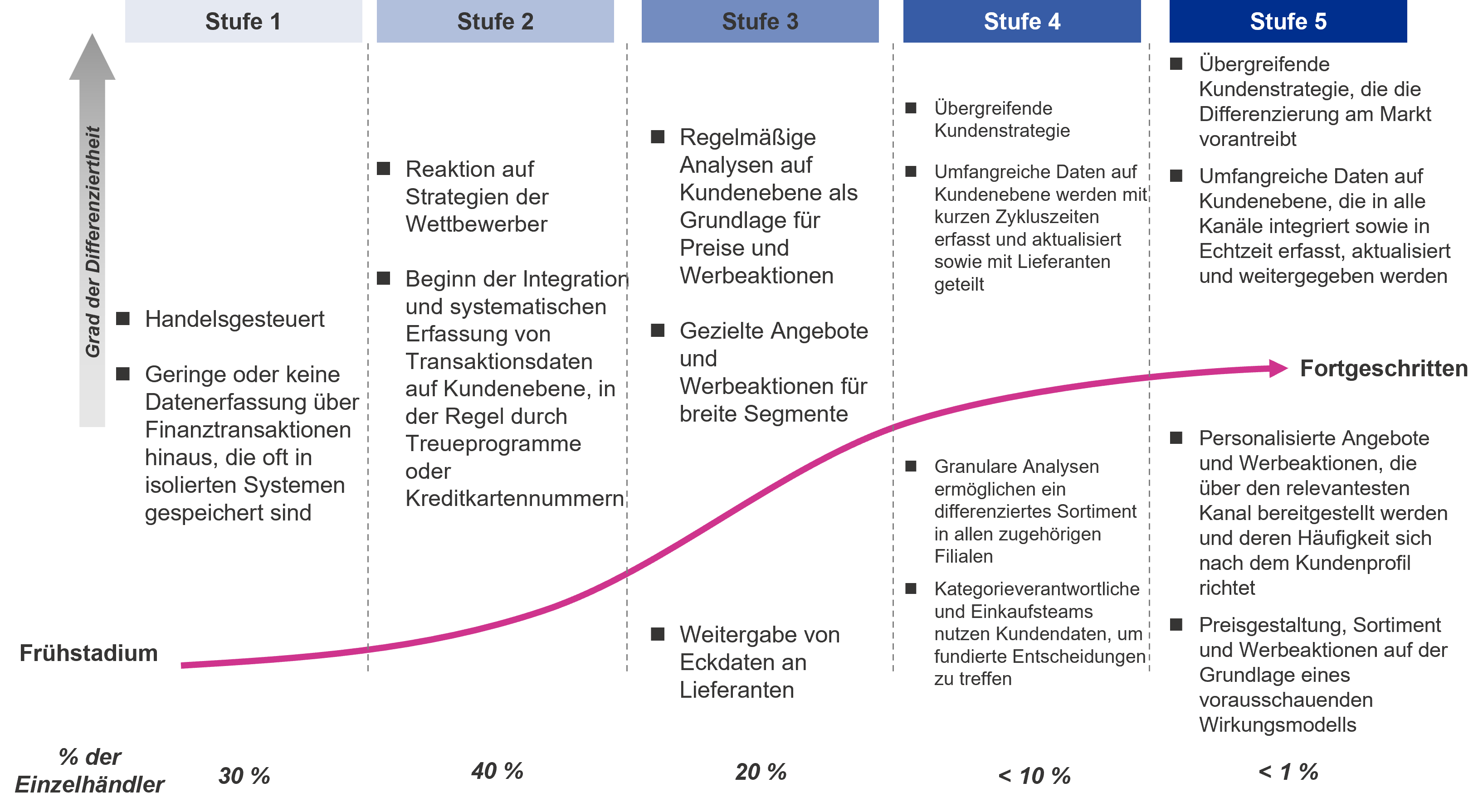Innovation und Aktivierung von Kundendaten für die nächste Ära des Einzelhandels
Wir stehen an der Schwelle der Zukunft des Einzelhandels, und es wird nie wieder so sein, wie es einmal war. David Ciancio, Global Head of Grocery bei dunnhumby, untersucht die Rolle von Kundendaten in einem sich verändernden Einzelhandelsmarkt.
Die globale Pandemie hat die Art und Weise verändert, wie sowohl Verbraucher als auch Marken agieren, und in vielen Fällen handelt es sich um eine dauerhafte Veränderung. Im Lebensmitteleinzelhandel zum Beispiel führen der Inflationsdruck und die drohende Rezession dazu, dass Kunden versuchen, ihre Kosten zu senken. Gleichzeitig beschleunigt COVID-19 die Verlagerung zum Online-Einkauf in rasantem Tempo. Einzelhändler müssen sich anpassen, was führt dazu, dass vier Schlüsselanforderungen im Lebensmitteleinzelhandelsmix immer wichtiger werden:
- Wert, einschließlich Preisinvestitionen, Betriebskapital und bessere Einkaufsstrategien
- Digitale Fähigkeiten, einschließlich E-Commerce, Partnerschaften und Entwicklung mobiler Anwendungen
- Neue Einnahmequellen, wie z. B. Medien, Erkenntnisse aus Daten und zusätzliche Einzelhandelsdienstleistungen
- Effizienzsteigerungen, beginnend im Personalmanagement in den Geschäften über die Automatisierung bis hin zu ERP und neuen Wegen zur Bereitstellung von „Convenience“
Wenn es etwas gibt, was deutlicher zu Tage getreten ist als alles andere, dann ist es der Wert von Daten für Einzelhändler. Eine der wichtigsten Lehren für Einzelhändler aus der Covid-19-Pandemie ist, dass Innovationen in den Bereichen Technologie, Dienstleistungen und Wissenschaft noch dringender erforderlich sind, um sich von der Konkurrenz abzuheben und letztlich zu überleben.
Bewährte Datengewohnheiten
Daten sind nicht länger eine „nette Zusatzinformation“, sondern ein strategischer Vorteil für jeden Einzelhändler, und die Möglichkeiten liegen auf der Hand. Dunnhumby-Daten zeigen, dass Einzelhändler, die Daten als strategischen Vorteil sehen, besser als ihre Wettbewerber abschneiden und im Durchschnitt eine Umsatzsteigerung von 3 % gegenüber den üblichen Geschäftsabläufen (unter Einbeziehung von mehr als 400 globalen Lebensmitteleinzelhändlern) und einer Zunahme am Marktanteil von 7 % (berechnet über fünf aufeinanderfolgende Jahre) erreichen.
Einzelne Einzelhändler meldeten sogar noch bessere Ergebnisse, wie z. B. ein skandinavisches Einzelhandelsunternehmen, das acht Jahre in Folge Marktanteilsverluste wettmachte und ein Wachstum von 4 bis 5 % verzeichnete, oder ein nordamerikanischer Lebensmittelhändler, der seinen Einzelhandelsumsatz in einem Zeitraum von zehn Jahren verdoppelte, indem er seine Strategie auf Kundenanalysen ausrichtete.
Natürlich sind nicht alle Einzelhändler auf der gleichen Stufe der Reifekurve, was die Nutzung von Daten für das Lebensmittelangebot betrifft. Die nachstehende Abbildung zeigt, dass nur 30 % der Einzelhändler Stufe 3 oder höher erreicht haben und sich damit in der besten Position befinden, um die Vorteile zu nutzen.

Der Wahrheit ins Auge sehen
Wie Mark Twain sagte: „Was uns in Schwierigkeiten bringt, ist nicht das, was wir nicht wissen. Es ist das, was wir mit Sicherheit wissen, was jedoch in Wahrheit falsch ist.“ Dies bietet wertvolle Anregungen für die Transformation im aktuellen Einzelhandelsmarkt.
Denken Sie an die Muster und Verhaltensweisen, die die Einzelhändler in den letzten Jahren zu kennen glaubten, die sich aber durch Daten als falsch erwiesen haben. „Wir müssen mehr Kunden akquirieren, um zu wachsen.“, „Loyale Kunden geben uns den größten Teil ihrer Ausgaben.“, „Preissensible Kunden sind weder profitabel noch loyal.“, „Kunden sind überall anders.“
Tatsächlich können Daten all diese und andere Behauptungen widerlegen und dabei eine gemeinsame Sprache über Wachstum schaffen. Es war noch nie so wichtig wie heute, strategische Entscheidungen auf der Grundlage echter Erkenntnisse zu treffen.
So zeigt die Analyse, dass Bestandskunden die besten Kunden sind, um Präferenzen aufzubauen. Ein Kunde mit einer starken Präferenz für Ihre Marke ist in der Regel mindestens so viel Wert wie 12 neue oder ungebundene Kunden. Sie sind am profitabelsten (weil sie dazu neigen, das Produkt zum vollen Preis und auch dann zu kaufen, wenn Sie sie belohnen) und erhöhen die Rentabilität Ihrer Investitionen ins Marketing im Vergleich zu den Investitionen in Angebote für ungebundene Kunden deutlich (oft bis zum Sechsfachen pro ausgegebenem Dollar). Deshalb liegen die großen Gewinne für Marken nicht in der Akquisition, sondern in der Festigung und dem Ausbau einer starken Präferenz bestehender Kunden für die Marke.
Übertragung auf die Filialstrategie
Die Idee einer gemeinsamen Kundensprache ist ein sehr wichtiges Konzept. Die Kunst für Einzelhändler besteht jedoch darin, diese in Maßnahmen umzuwandeln, die Kunden im Geschäft spüren, um so das Einkaufserlebnis zu verbessern. Um Loyalität zu schaffen, ist wesentlich mehr als nur ein Treueprogramm erforderlich.
Daten können Einzelhändler dabei unterstützen, den Kanal/die Filiale angemessen zu gestalten, sei es durch eine intelligentere Preisgestaltung, bessere Werbeaktionen oder ein kundenorientiertes Sortiment. Es ist außerdem wichtig, die Botschaft richtig zu vermitteln, unter anderem durch personalisierte Medien und Kommunikationen sowie durch wirksamere Kampagnen in den Massenmedien. Und schließlich sind die richtigen Prozesse in Bereichen wie Testen und Lernen, Mitarbeitermotivation und effektivere Arbeitsmethoden erforderlich.
Vor allem aber muss die Kundenwissenschaft mit der Kunst des Einzelhandels, die Kunden zu begeistern, in Einklang gebracht werden, um so den Umsatz durch vier wichtige Hebel zu steigern: bessere Verfügbarkeit, mehr Transaktionen, bessere Preisgestaltung/Werbeaktionen und ein optimiertes Sortiment.
Ihr wichtigstes Gut
All dies zeigt das Potenzial – und die Notwendigkeit – von Daten zur Steuerung aller wichtigen Entscheidungen und Prozesse im modernen Einzelhandel.
Dies gilt sowohl im Veränderungsmanagement, um eine Kultur zu fördern, die sowohl Kunst als auch Wissenschaft in Einklang bringt, um den den Kunde in den Mittelpunkt zu stellen, oder bei der Beschleunigung von Systemen, um die richtigen internen Fähigkeiten für die Kunden freizusetzen. Daten befähigen und qualifizieren Mitarbeiter innerhalb der Unternehmen und unterstützen die Überprüfung von Richtlinien, die der Zufriedenheit im Wege stehen. Sie fördern auch die Belohnungen, indem sie die Identifizierung von KPIs rund um Kundenprioritäten ermöglichen.
Daten sind das wichtigste Gut eines jeden Einzelhandelsunternehmens. Können Sie es sich leisten, sie zu ignorieren?
TOPICS
RELATED PRODUCTS
Make Retail Media work for your business with Customer Data Science
Retail Media solutionsHelping brands get the most from retail media
Audience Targeting solutionsThe latest insights from our experts around the world
Retail Media: Aus der Sicht des Käufers
Wie Shopper Insights den Erfolg im Lebensmitteleinzelhandel vorantreiben



